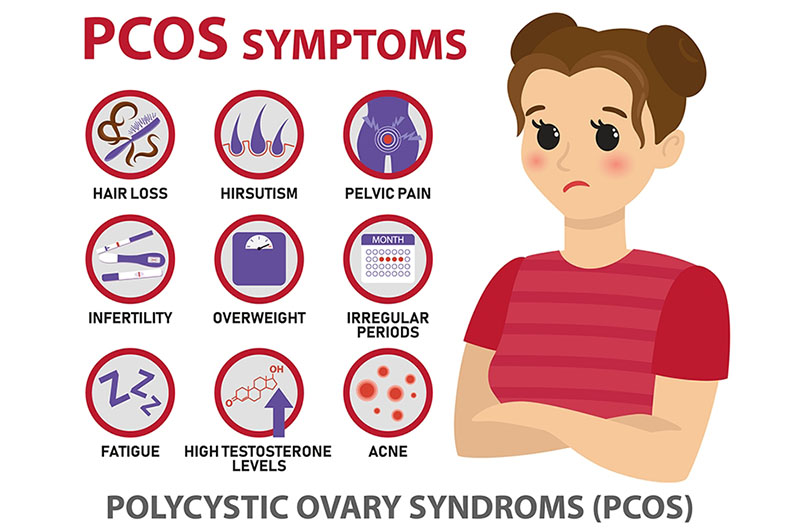
Polycystic Ovarian Syndrome - Series 2
Symptoms
There was a general belief in my area while growing up that women who had facial hair were wicked. I don’t know how that assertion came about but we believed it based on experiences and stories.
Those women probably had PCOS and were unfortunately being body shamed. Although facial hair is a symptom of PCOS, not everyone with facial hair has PCOS. This article will focus on the symptoms of PCOS and other health challenges associated with it.
How do I know if I have PCOS?
Symptoms of PCOS are mainly a result of hormonal abnormalities. They may start soon after you have your first menses or when you’re between the ages of 20 and 30 years.
The 1st article in this series mentioned that the presence of 2 out of 3 main symptoms is enough to make a diagnosis of PCOS. In addition to these, there are other symptoms of PCOS as well as health challenges or complications associated with the symptoms of PCOS.
The symptoms of PCOS can be reproductive, metabolic, or psychological.
Reproductive system symptoms
In PCOS, higher androgen levels (male hormones) including testosterone can interfere with normal levels of female hormones.
In addition, people who have PCOS have higher levels of inflammation with the release of chemicals called cytokines. These cytokines cause a reduction in the actions of the female hormone, follicle-stimulating hormone (FSH) that causes ovarian follicles to grow and release egg(s). FSH also causes the release of other hormones such as oestrogen and progesterone.
The reduction in the action of FSH means that the follicles stop growing and the eggs hardly get large enough to be released. Hence, the lack of ovulation and difficulty with conception (infertility).
When this imbalance of hormones ensues, symptoms include:
- Lack of ovulation
- Infertility
- Irregular menstrual periods
- Pimples may start during puberty and persist well into your twenties and thirties
- Reduction or loss of scalp hair (alopecia) in the same pattern as male baldness.
- Excess hair growth in the face, chest, tummy and upper thighs.
Metabolic Symptoms
People who have PCOS have more fat distributed around their tummy and internal organs. This contributes to the resistance of the body tissues to the actions of insulin. Insulin compels the body tissues to take up glucose from the blood and thereby reduces blood glucose. When the body does not respond by taking up glucose, the pancreas produces even more insulin. High insulin levels further increase the action of male sex hormones and the body resists the uptake of glucose.
This condition is called insulin resistance which leads to high levels of insulin in the blood. Insulin resistance can lead to
- Pre-diabetes
- Type 2 diabetes
- High cholesterol levels
- Obesity
Psychological
Physical symptoms of PCOS are associated with body shaming which may lead to poor self-esteem and may affect the perception of self in terms of body image and identity. Psychological problems associated with PCOS include:
- Mood problems such as anxiety and depression. Women who have PCOS have significantly higher anxiety particularly if they also struggle with infertility
- Depression is more common in those who are overweight and have high male sex hormone levels
- Eating disorders such as bulimia and anorexia Nervosa are also more common
- Poor quality of life
Other Health Challenges Associated with PCOS
In addition to the symptoms above, other health problems associated with PCOS can be complications of some symptoms. They are as follows:
- Acanthosis Nigricans: This is a skin disorder characterised by black skin patches, especially around skin folds such as the neck and armpit. It occurs as a result of insulin resistance
- High blood pressure
- Sleep apnea: This is a condition in which sleep is interrupted by repeated stops in breathing that last a few seconds. Obesity contributes to the development of this condition.
- Obesity
- Endometrial cancer is up to 17 times more common in women with PCOS than in the general population. This is because the lining of the womb (endometrium) is exposed to high levels of estrogen for a long time. They don’t get to shed the endometrial lining often due to infrequent menses. Insulin resistance and obesity also contribute to this.
- Hidradenitis suppurativa: A skin condition characterized by bumps and boils in the armpits, groin, thighs, and under the breasts associated with PCOS.
Up to 50 percent of women who have PCOS will develop impaired glucose tolerance or type 2 diabetes mellitus by the age of 40 years.
Although there are many symptoms, they are all treatable with medications, diet, and certain lifestyle practices. Treatment depends on the phenotype and symptoms in an individual.